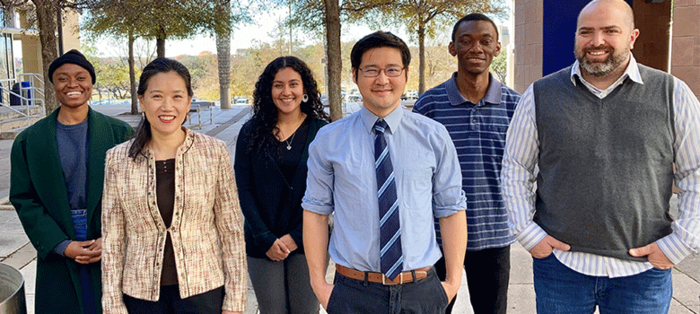An interdisciplinary research team at The University of Texas at San Antonio has successfully developed an innovative inhibitor that shows promise in fighting obesity and potentially preventing heart disease. Francis Yoshimoto, an assistant professor in the UTSA College of Sciences’ Department of Chemistry, is leading a team that developed an anti-obesity drug that blocks the effects of cytochrome P450 8B1, the enzyme linked to cholesterol absorption and obesity.

Credit: The University of Texas at San Antonio
An interdisciplinary research team at The University of Texas at San Antonio has successfully developed an innovative inhibitor that shows promise in fighting obesity and potentially preventing heart disease. Francis Yoshimoto, an assistant professor in the UTSA College of Sciences’ Department of Chemistry, is leading a team that developed an anti-obesity drug that blocks the effects of cytochrome P450 8B1, the enzyme linked to cholesterol absorption and obesity.
Yoshimoto collaborated with Eunhee Chung, an associate professor in the UTSA College of Health, Community and Policy’s Department of Kinesiology to test the new drug. After designing and synthesizing it, Yoshimoto sent test samples to Chung’s National Institutes of Health-funded laboratory, where she and her research team are conducting research on the effects of bioactive compounds—chemicals found in small amounts in plants and certain foods—and how exercise can be used to treat obesity and associated metabolic disorders.
Their research findings were published in the February 2022 issue of the scientific journal, Steroids.
“Growing up, I dreamed of helping my family members, who were affected by obesity and heart disease and other medical conditions,” Yoshimoto said. “This dream is now turning into a reality, as we have developed a small molecule that can be used to fight obesity, a problem seen in many families around the world.”
“As an exercise physiologist, I truly believe exercise is the best medicine to fight against noncommunicable diseases,” added Chung. “Unfortunately, the adherence to exercise is quite low, and the prevalence of obesity is continuously rising. Based on promising data, I have high hopes of further testing Dr. Yoshimoto’s inhibitor.”
UTSA’s drug has the potential to stop the activity of P450 8B1, the enzyme that creates cholic acid in the body. This inhibition, in turn, decreases cholesterol absorption. This process may hold the key to treating obesity-associated metabolic disorders and other diseases linked to obesity, such as heart disease and diabetes.
The team’s research included treating mice with the inhibitor drug for seven days. The result was a decrease in the levels of glucose in their blood—despite having been fed a high-fat and high-sucrose diet—without affects to their body weight. The results demonstrate how a P450 8B1 inhibitor could lead to a healthier metabolic profile and its potential could lead to developing a therapeutic strategy to treat obesity-associated insulin resistance.
Yoshimoto and Chung’s work is representative of UTSA’s mission to develop solutions for complex challenges that will improve the health and well-being of society. Creating a drug effective in preventing obesity could improve quality of life around the world.
According to the World Health Organization, 1.9 billion adults worldwide were overweight in 2016, and 650 million were classified as obese. Closer to home, one in every four deaths in the U.S. is due to heart disease, of which obesity is a major contributor. Locally, 71% of adults are overweight or obese, according to a recent report from the San Antonio Metropolitan Health District.
“These results show how our research in synthetic chemistry can significantly contribute to the well-being of society by treating obesity and heart disease,” Yoshimoto said.
Yoshimoto’s medicinal chemistry research was made possible by the Max and Minnie Tomerlin Voelcker Fund, which contributed $450k in 2019 to support anti-obesity research.
Chung’s research was supported by the National Institutes of Health [NIH, NIGMS, grant GM125603].
Journal
Steroids




